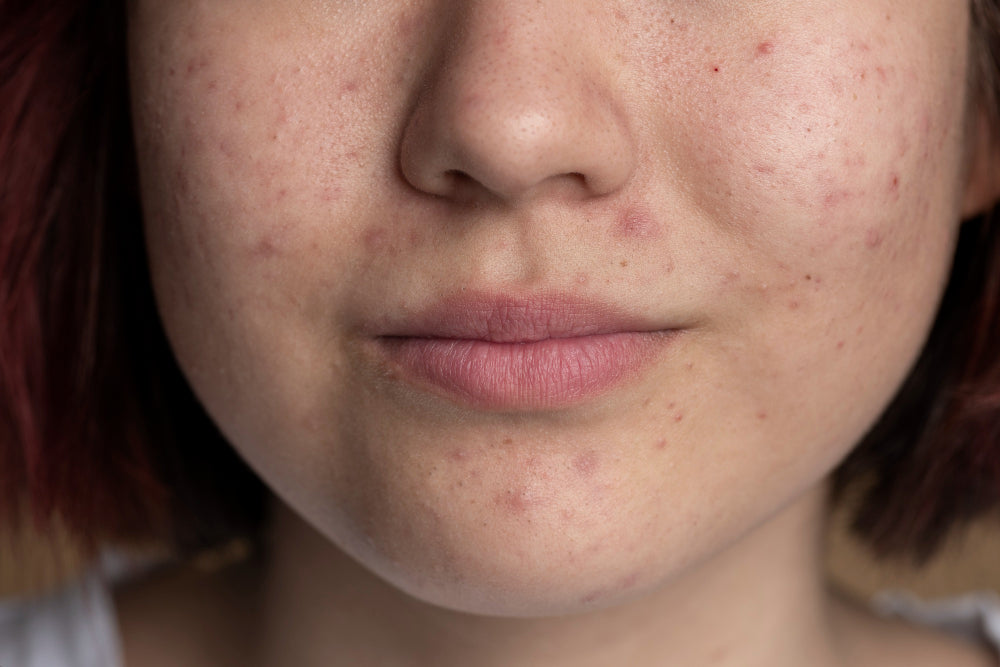We're diving into a topic that is sparking curiosity and concern in the beauty world today- the potential link between hyaluronic acid and acne.
Let's get to the burning question. Can hyaluronic acid cause acne? The short answer is not typically. Hyaluronic acid is known for being non-comedogenic, which means it doesn't clog your pores.
If you've been pondering whether hyaluronic acid (HA) can lead to breakouts or even purging, you've come to the right place. Read on to find out more!
The HA Craze – A Quick Recap
Before we go into this quest for answers, let's refresh our knowledge about hyaluronic acid. This remarkable substance is like a tall drink of water for your skin. It's a natural component in your body, particularly in your skin, connective tissues, and eyes.
Hyaluronic acid's superpower lies in its ability to attract and retain moisture. It can hold up to 1,000 times its weight in water, translating to a smoother, plumper, and more hydrated complexion.
With these benefits, it's no wonder why HA has become a star ingredient in various skincare products. However, the skincare world isn't always black and white, and there are some nuances to consider:
1. Product Formulation Matters
It's essential to be aware of the overall formulation of the HA product you're using. If it contains other ingredients that are known to be comedogenic or skin irritants, then you might be at risk of breakouts. So, always check the ingredient list. If it's a mile long with unpronounceable words, it's a good idea to tread cautiously.
2. Skin Type Has A Role

Not all skin is created equal. If you have naturally oily or acne-prone skin, you might be more vulnerable to breakouts when using heavy or occlusive HA products. For these skin types, opting for lighter formulations is generally a safer bet. Listen to your skin - it often knows what it needs.
3. The Devil is in the Details
Using any product in excess can overwhelm your skin's natural balance. So, while HA (Hyaluronic Acid) is fantastic, don't drown your skin in it. Follow the recommended usage guidelines and maintain a balanced skincare routine.
4. Allergies and Sensitivities
In rare cases, individuals may have an allergic reaction to hyaluronic acid itself or other components in the skincare product. It could lead to skin irritation that might resemble acne. If you're unsure about potential allergies, consider doing a patch test before slathering a new product over your face.
The Purge Paradox
Now, let's talk about the notorious purge. Some of you might have heard about it, especially concerning hyaluronic acid and other skincare products. But what exactly is this mysterious phenomenon?
Does Hyaluronic Acid Cause Purging?
In addressing the common query of whether ordinary hyaluronic acid induces purging, the concise response is no. Hyaluronic acid itself doesn't cause purging. Purging is a process that occurs when certain skincare ingredients, like retinoids or alpha hydroxy acids, speed up your skin's natural exfoliation process. It can lead to an initial outbreak of blemishes as your skin clears out impurities.
Hyaluronic acid doesn't possess the properties that stimulate this process. It's more about hydration and moisture retention rather than encouraging cell turnover. It's also a good match for oily skin types. So, if you experience breakouts after introducing HA into your skincare routine, it's more likely due to other factors.
The Hyaluronic Acid Acne Connection

So, where does this leave us? Can hyaluronic acid help with acne? The answer is not a direct one. While it's generally not associated with causing acne, it might not be the magical cure.
Hyaluronic acid primarily functions as a hydrating agent and a skin plumper. It helps maintain the skin's moisture barrier, which is crucial for overall skin health. In that sense, it can indirectly benefit those dealing with acne.
Dry and irritated skin can exacerbate acne, so keeping your skin well-hydrated is essential. HA can be an ally in this battle, primarily when used with other acne-fighting ingredients.
Does Hyaluronic Acid Help Acne?
Hyaluronic acid may not directly help with acne. Acne is primarily caused by factors such as excess oil production, clogged pores, and inflammation. While hyaluronic acid can provide effective moisture to the skin, it doesn't address the root causes of acne.
However, it can indirectly benefit individuals with acne-prone skin. By maintaining proper skin hydration, hyaluronic acid helps in creating a balanced and healthy skin barrier. When your skin is adequately hydrated, it is less likely to overcompensate by producing excess oil, which can contribute to acne.
Furthermore, well-hydrated skin is more capable of repairing itself and may recover from acne lesions faster. To treat acne, it's advisable to use targeted acne-fighting products like salicylic acid or benzoyl peroxide in conjunction with a suitable skincare routine.
While hyaluronic acid can be a valuable addition to your skincare regimen for overall skin health, it should not be relied upon as the sole solution for managing acne.
The Verdict
In conclusion, hyaluronic acid is more often a friend than a foe. It's a fantastic hydrating ingredient that, when used correctly and in moderation, can benefit your skin. However, like with any skincare product, it's essential to be mindful of your skin's unique needs and sensitivities.
If you're concerned about how hyaluronic acid may affect your skin or cause purging, consult a dermatologist or skincare professional for personalized guidance. They can help you understand the nuances of your skin and create a tailored skincare routine that works for you.
Remember, there's no one-size-fits-all answer in the world of skincare. It's all about finding what suits your unique needs and preferences. So, embrace hyaluronic acid, enjoy its hydrating benefits, and let your skin shine!
Experience the hyaluronic difference with NotoxMD™ skincare!
Also read:
Niacinamide Vs Hyaluronic Acid: Which One Is Better?

